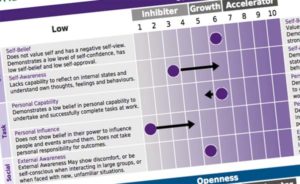How do we measure coaching impact?

Dr Jodi O’Dell
For me, the question, “How do we measure coaching impact?” prompts a lot of questions. Some of these include:
- What do we mean by impact?
- What should we be measuring?
- How do we measure it? (whatever ‘it’ is)
- When should we measure?
- Why measure at all?
Having been asked to speak on this topic numerous times, here are my thoughts.
We need definitions
First and foremost, it is important to be clear on definitions. What do we mean by ‘impact’ and what do we mean by ‘measure’? Essentially, what is driving this debate is the increased demand for quality and justification for investment spend on services like coaching.
With a more discerning, educated coaching buyer in our midst, the demand for rigour increases.
However, within coaching there is the added complexity when it comes to measuring impact, especially when we try to equate impact with return on investment. In the case of coaching, where outcome measures are less tangible and therefore, harder to quantify, conventional methods don’t apply. Herein lies the heart of the dilemma. How do we measure something which is notoriously difficult to quantify, let alone measure? Historically, coaching research has relied far too heavily on anecdotal, qualitative evidence.
What is coaching impact?
So, what do we mean by impact within coaching? I would argue that within coaching when we talk about impact, essentially we are talking about outcomes, i.e. what is different as a result of the coaching? With this definition in mind, what we are talking about is change.
Change in the individual, change in results, change in performance, change in thinking, change in behaviour etc. etc. One would hope that those being coached will leave the coaching engagement more empowered, more self-aware and more confident to influence the changes they desire, for themselves, their teams and their organisation. When this happens, we see an impact on results, performance and ultimately, on bottom line profits.
So, if we define impact in terms of change and more specifically, the results of change, then how do we measure this change? And, what change precisely should we measure?
How do we measure change?
Having researched coaching effectiveness for many years, both as an academic and as a coaching psychologist, the evidence points very clearly to some key things.
Real change, and by that I mean sustainable change, is a change in thinking and behaviour. When we are successful at facilitating this for our clients, we have a powerful impact.
The key areas that influence this change relate to perceptions. More specifically, self-perceptions about confidence, open-mindedness and commitment and motivation towards our goals. When these factors are aligned, and congruent, we optimise our true potential.
 All the evidence from my research has been captured into a diagnostic called Engage. Amongst its many features, one which stands out and which is attracting a lot of attention, is Engage’s unique ability to measure impact. It does this by capturing the degree of ‘shift’ and ‘change’ over time. This offers a robust and validated way of consistently and accurately measuring coaching impact. Drilling down into those perceptions, which underpin work behaviours, which ultimately drive performance.
All the evidence from my research has been captured into a diagnostic called Engage. Amongst its many features, one which stands out and which is attracting a lot of attention, is Engage’s unique ability to measure impact. It does this by capturing the degree of ‘shift’ and ‘change’ over time. This offers a robust and validated way of consistently and accurately measuring coaching impact. Drilling down into those perceptions, which underpin work behaviours, which ultimately drive performance.
If you’d like to find out more about how to measure coaching impact, how Engage works, or how you can become an Engage Accredited Coach, or how to use this within your organisation, please take a look at our webinars, contact us here, or call us on +44 (0)20 3393 2499.
(C) Engage Coach International 2016. All rights reserved. Author: Dr Jodi O’Dell, August 30th 2016.
Interested in accreditation? Check out our reviews, expert analysis and pricing;
